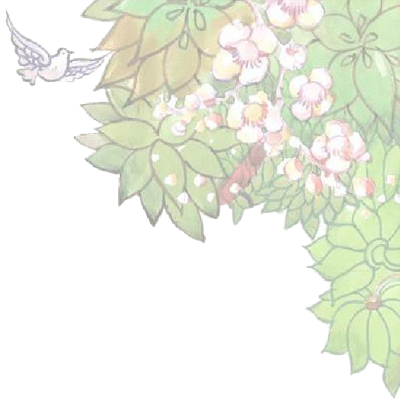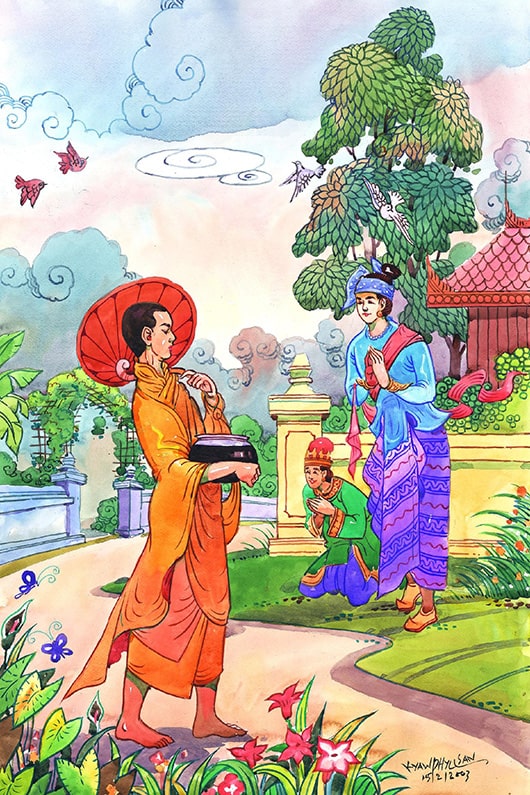13話 四番目の予兆

第1部 出家まで
第4章 重大な前ぶれ

シッダッタ王子は引きこもって、外出のときに見た三つの光景についてもの思いにふけることがさらに多くなった。あまりに何度も考えたので、ついには人びとが生まれ、老いて、病気に圧迫され、最後に死んでしまうことを完全に把握した。そういうわけで、生命の性質について広い判断力を獲得した。生命の連鎖から誰も逃れることができないことに王子は気づいたのだ。しかしそれを知るだけでは満足せず、まだ見ていない生命の別の側面について、もっと知りたい、という強い好奇心があった。このようなすべての恐ろしい現象を乗りこえる道が絶対にない、などとは、王子は受け入れなかったのだ。
一方、王子が三つの光景について考えることから心をそらすようにと、スッドーダナ王はどんなときにもたくさんの娯楽を手配した。それは二、三か月間、ずっとつづいた。しかし好奇心から知りたがり、もの思いにふけりがちな王子の性格は、そうした娯楽でかんたんに左右されないほど、そのときまでに生命の理解がすでに広くなっていた。
四か月後、またも王子は父王に願い出て、宮殿をはなれて王立庭園へ見物に出かける許可をもとめた。生命の別の面を見るためである。王には、王子の礼儀正しい願いを拒絶する理由が、もはやなかった。
その幸先のよい日、王子はチャンナをお供にして王立庭園に出かけた。カピラヴァットゥの都を通り抜けて行ったが、街は活気にあふれ、いくつか新しい店も開店していた。王国の経済が発展し、人びとの生活も繁栄しているのがわかり、王子は幸福だった。街の暮らしで場ちがいなものは何一つないと感じながら、王立庭園までの道のりを王子は歩いた。
王立庭園はこの日とても美しく見えた。木々には花が咲き、実がなって、庭園に魅力ある印象を添え、美しさを引きたたせている。やわらかいさわやかな微風が吹き、小鳥たちがつぎつぎに囀っている。まるでみんなに、その鳴き声の調べの美しさを楽しむためにきてください、と招待しているかのようだった。こうしたすべてが庭園の雰囲気に生気を与え、いのちを吹きこんでいた。
王子が坐って庭園を楽しんでいる最中、頭と髭をきれいに剃った男が、はるか向こうからやってくるのが見えた。晴ればれとした顔で、穏やかな表情をしている。ほかの者が着ているようなものではなく濃い黄のサフラン色のゆったりした外衣をまとい、心身のはたらきがみごとに制御されているらしく、ひっそり歩いているのだ。このすばらしい風景に王子はびっくりし、男を注意深く観察して、いったいどういう人なのだろうか、と思った。
好奇心から、お供の御者にきいた。
「チャンナよ、ご覧! あの方は、ほかの人とちがうよ。きれいに頭と髭を剃っている。サフラン色の外衣を着て、托鉢の碗を手に持っている。晴ればれとして感じのよい穏やかな顔をしている。ひっそり歩き、視線は下方へ向いて、伏し目がちだ。おおチャンナよ、あの方は誰なんだ?」
「殿下、僧でございます」とチャンナが答えた。
王子は驚いて、つづけてきいた。
「僧? いったい『僧』って、どういう意味なんだ?」
「僧とは家庭生活をはなれた者でございます。献身のしるしにサフラン色の外衣をまとっております。心の中ではつねに功徳ある行為をしようと思っておりまして、それはなぜかというと、非難するところがない、と知っているからでございます」と、チャンナは説明した。
シッダッタ王子は、僧とはほんとうにどんなものか知りたい、と駆りたてられるような思いを感じた。王子には、この僧はほかの者たちとちがって立派で品格があるように見えたのだ。チャンナの短い説明ではもの足りず、満足できなかった。そこで、王子は立ち上がり、僧に近づいて、このようにきいた。
「そこの方、お見かけしたあなたの姿は、ほかの人とちがいます。頭がほかの人のようではありません。衣もまたほかの人のようではない。あなたは、どういう方なのですか?」
「殿下、わたしは僧でございます」
王子はとても驚いた。変装しているにもかかわらず、きいた者が誰なのか、この僧は知っているのだ。ともあれ、つづけてきいてみた。
「どうか、わたしに、もっと話してください! 僧とは、どういう意味なんでしょうか?」
「わたしは、在家の生活から外に出家した者です。髪と髭を剃りおろして、サフラン色の外衣をまといました。この世のすべての不幸を引き起こす生まれ、老い、病い、死、を乗りこえる薬を探すために、この世の快楽を捨てたのです。この世の苦から解脱する道を探していて、あらゆる有情の幸せの増大のためにはたらいています」
王子は好奇心に駆られて、さらにきいた。
「それで、どのように生きていらっしゃるのですか? どこにお住まいか? あなたはとても幸福そうに見える。生命の性質への悩みはないようだ。なぜですか?」
「わたしは林の中にいるか、あるいは僧院にいることもあります。そして信仰心の篤い家々に、乞食のための托鉢に、毎日まわります。お布施していただいた食べ物で、わたしのいのちを養っています。限られた持ちものと必要なもので満足し、簡素に生きています。道をわきまえているので、わたしは幸福で、生命の性質の悩みはありません。土地から土地へ行って、人びとに、どのようにして幸福な人生を生きるかを教えることに、わたしのいのちを捧げています。生きものをいじめず、善行為をして、心を清らかにするのです」
僧とはどんなものか、このように説明してくれたのである。
息子ラーフラの誕生
立派で品格ある僧に会って、王子はとても幸福だった。僧が説明してくれたように、みじめな生命を乗りこえる真の道がある、と知ったからだ。宮殿に戻るかわりに、その日を庭園で静かに過ごしつづけた。王子の心は、僧になってきれいで清らかな生き方をする、という考えでいっぱいになった。
王子が涼しい木陰の下に坐って僧になるという考えを反芻している最中に、スッドーダナ王から使者がきて、次のように知らせた。
「殿下、よきお知らせをお持ちしました。お妃さまが、かわいい男の子を出産された、とご承知おきくださいませ」
よろこびを見せるどころか、王子はその知らせをきいて、幸福ではなかった。そしてことば少なく、このようにいった。
「障礙(rāhu(ラーフ))がわたしに生まれた。大きな束縛がわたしに生じた」
それは障礙だった。なぜなら王子は家族を愛し、新しく生まれた息子を愛しているのだから。家族と息子への愛着は、僧になると決めたその決意の固さの妨げになる、と王子は考えたからである。
知らせを受けたとき王子が発したことばを知って、スッドーダナ王は赤ちゃんに「ラーフラ」と名づけた。
キサー・ゴータミー姫の歓喜の恋歌と真珠の首かざり
宮殿への帰り道、シッダッタ王子は釈迦族のキサー・ゴータミー姫の邸宅に通りかかった。姫は魅力と美貌の持ち主だった。ちょうどそのとき、姫は邸宅のテラスの上にいて、王子が通りがかるのを見ていた。若く、外見すぐれ、落ちついた王子の容姿に、姫は感銘をうけた。たいへん感激し、姫の心には歓喜の波が押し寄せた。みなぎる思いのままに、姫は幸福感を恋歌で表現したのだった。
やすらぎと幸福は まさに幸運な母のこころ
やすらぎと幸福は まさに幸運な父のこころ
やすらぎと幸福は まさに幸運な娘のこころ
そんな娘の夫になるお方は かくの如きかれ
この歓喜の恋歌をきいて、そのような人物が母や父、妻に与えるやすらぎと幸福の光景を王子は思い描いた。それは束の間、たまゆらの幸福に過ぎない、と王子は気づいていた。もし、情熱の炎、憎悪の炎、妄想の炎、そしてうぬぼれ、邪見などの心の汚れが消滅したなら、そのときひとは真の幸福と真の心のやすらぎを経験するであろう、と。キサー・ゴータミー姫が感じのよいことばで述べたやすらぎの要素は、すべての苦の滅尽によって真実になるだろうと。それは、まるで王子が滅尽の要素「寂静(ニッブティ)」を探求しに行くことをまた思い起こさせるかのようだった。
王子はそのとき十万金の価値のある美しい極上の真珠の首かざりを首からはずして、感謝のしるしに姫に与え、贈り物にした。こうして王子は、永遠のやすらぎと幸福である「涅槃(ニッバーナ)」を探求するために、僧になる決意を、さらに固めたのである。
しかしキサー・ゴータミー姫はまちがった印象をもってしまった。シッダッタ王子がすてきな贈り物をくれたのは、姫に気があるからだ、とかんちがいして大喜びしたのである。
※ 画像やテキストの無断使用はご遠慮ください。/ All rights reserved.

Episode 13. THE FOURTH GREAT OMEN: A MONK
Prince Siddhattha secluded himself more often, contemplating the three sights he had seen during his tours. He thought about them so many times that in the end he fully comprehended that people are born, grow to old age, are oppressed by sickness, and will eventually be dead. Thus, he obtained a wider understanding on the nature of life. He noticed that no one could escape from this chain of life. But not
being satisfied only to know this, he was very curious to know more about the other sides of life that he might not have seen yet. He did not accept that there was absolutely no way to overcome all these terrible phenomena.
In the mean time, King Suddhodana always arranged for many enjoyments for the prince to distract his mind from thinking of the three sights. It went on this way for a few months. But, the inquisitive and contemplative character of the prince was not easily swayed by those entertainments as by now he already had such an extent of
understanding of life. After four months, once again he approached his royal father asking for his permission to leave the palace for a pleasure trip to the royal garden to see another aspect of life. The king had no more reasons to reject his son’s polite request.
On that auspicious day, the prince, accompanied by Channa, went out to the royal garden passing through the City of Kapilavatthu. He noticed that the city was abuzz with more activities, with some new shops being opened. The prince was happy to learn that the economy of his kingdom was developing and that the people’s prosperity rose. Not sensing anything out of place in the city life, the prince continued his trip to the royal garden.
The royal garden looked very beautiful that day. Trees were blossoming with flowers and fruits as if adorning and beautifying the surroundings. The soft and fresh breeze was blowing while birds were chirping one after another, as if inviting everyone to come and enjoy the beauty of their melody. All this made the atmosphere of the garden so inspiring.
While the prince was sitting and enjoying the garden, he saw a man with a clean shaven head and beard coming from afar, his face bright and calm. He donned a saffron-coloured robe unlike those worn by others, and he was walking quietly with his faculties well-controlled. This wonderful scene so amazed the prince that he watched that man attentively and wondered what he was known as.
Being curious, he asked his charioteer: “Channa, look! That man is not like others. He has a clean shaven head and beard. He wears saffron-coloured robes and carries an alms-bowl in his hands. His face is bright, pleasant-looking and calm. He walks quietly, and his eyes are cast downwards. O Channa, who is he?”
“Your Majesty, he is a monk,” Channa replied.
The prince was astonished and continued asking: “A monk! What is
meant by a ‘monk’?”
“A monk is a man who has left the family life. He puts on saffron-coloured robes as a symbol of sacrifice. He bears in his mind always to do meritorious deeds because he knows it is blameless,” Channa answered.
Prince Siddhattha felt an urge to learn more what a monk really is. To him, a monk looked admirable and noble, unlike others. The prince was not satisfied with the short explanation given by Channa. He then stood up and approached the monk. The prince asked him: “O man, your appearance is different from those of others; your head is unlike the heads of others; your clothes are also unlike the clothes of others.
Who are you?”
“Your Majesty, I am a monk,” the monk replied.
The prince was quite surprised that the monk knew who he is though he as dressed in disguise, but he continued asking anyway: “Please tell me more! What do you mean by ‘a monk’?”
The monk explained: “I am one who has gone forth from household life. Having shaved off my hair and beard, I put on saffron-coloured robes. I have given up all worldly pleasures in order to seek the medicine for overcoming birth, old age, sickness and death, all of which cause unhappiness. I seek the way of deliverance from worldly suffering, and I work for the promotion of welfare for all sentient beings.”
Inquisitively, the prince asked him further: “And, how do you live? Where do you stay? You look so happy without worrying the nature of life. Why?”
“I may stay in the forest or in a monastery, and I go on alms-round for receiving alms-food offered by devout families everyday. With this alms-food, I can sustain my life. Satisfied with limited properties and needs, simply I live; I am happy and have no worry of the nature of life because I have realised the way. I dedicate my life by going from place to place to teach people how to live a happy life by abstaining from ill-treating living beings, performing good deeds and purifying the mind,” the monk described.
The Birth of the Prince’s Son—Rāhula
The prince was very happy to see the admirable and noble monk. He knew that there was a true way for overcoming the misery of life as what the monk had described. Instead of going back to the palace, he continued spending that day in the garden quietly. His mind was occupied with thoughts of a clean and pure way of life by becoming a monk.
While the prince was sitting under a cool shady tree and reflecting the idea of becoming a monk, a royal messenger sent by King Suddhodana came to him and said: “Your Majesty, I come with good news for you; may you know that your wife has given birth to a lovely baby boy.”
Instead of showing delight, the prince was unhappy to hear the news and he remarked: “An obstacle (rāhu) has been born to me; a great bondage has arisen to me (Rāhulajāto, bandhanaṁ jātaṁ)!” It was an obstacle because he loved his family and his son, the newborn. He thought that attachment to his family and son would hinder his intention to be a monk as what he had decided. Knowing what the prince had uttered when he received the message, King Suddhodana then named the baby “Rāhula”.
Kisā Gotamī’s Verse of Joy and the Pearl Necklace
On the way back to the palace, Prince Siddhattha passed by a mansion of a Sākyan Princess named Kisā Gotamī, who possessed charm and beauty. At that time, she was on the terrace of her mansion and she saw the prince passing by. She was impressed by the appearance of the prince, who was young, good looking and calm; she felt very delighted and her heart was inundated with joy. Spontaneously, she expressed her happiness:
“Nibbutā nūna sā mātā
Nibbutā nūna so pitā
Nibbutā nūna sā nārī
Yassā’yaṁ īdiso patī”
“Peaceful and happy indeed is the mind of a fortunate mother.
Peaceful and happy indeed is the mind of a fortunate father.
Peaceful and happy indeed is the mind of a fortunate woman
Who has become the wife of such a husband as he.”
Hearing the verse of joy, the prince reflected that the sight of such personality would give peace and happiness to the mother, the father and the wife. The prince recognised that it was only temporary happiness. Only if the fire of passion, the fire of hatred, the fire of delusion and defilements such as conceit, wrong views, etc. were extinguished, would then one experience the true happiness and the
true peace of mind.
Princess Kisā Gotamī has mentioned pleasant words about the element of peace which would become true by the extinction of all sufferings, as if reminding the prince to go in search the element of extinction, “nibbuti”. The prince then took off an exquisite pearl necklace worth one hundred thousand from his neck and presented it to her as a token of appreciation. Thus the prince became more firm with his
determination to become a monk to search for eternal peace and happiness, “Nibbāna”. However, Kisā Gotamī had the wrong impression; she was overjoyed with the thought that Prince Siddhattha had sent her the lovely present because his mind was inclined to her.
※ 画像やテキストの無断使用はご遠慮ください。/ All rights reserved.
アシン・クサラダンマ長老
1966年11月21日、インドネシア中部のジャワ州テマングン生まれ。中国系インドネシア人。テマングンは近くに3000メートル級の山々が聳え、山々に囲まれた小さな町。世界遺産のボロブドゥール寺院やディエン高原など観光地にも2,3時間で行ける比較的涼しい土地という。インドネシア・バンドゥンのパラヤンガン大学経済学部(経営学専攻)卒業後、首都ジャカルタのプラセトエイヤ・モレヤ経済ビジネス・スクールで財政学を修め、修士号を取得して卒業後、2年弱、民間企業勤務。1998年インドネシア・テーラワーダ(上座)仏教サンガで沙弥出家し、見習い僧に。詳しく見る
奥田 昭則
1949年徳島県生まれ。日本テーラワーダ仏教協会会員。東京大学仏文科卒。毎日新聞記者として奈良、広島、神戸の各支局、大阪本社の社会部、学芸部、神戸支局編集委員などを経て大阪本社編集局編集委員。1982年の1年間米国の地方紙で研修遊学。2017年ミャンマーに渡り、比丘出家。詳しく見る

※ 画像やテキストの無断使用はご遠慮ください。
All rights reserved.

